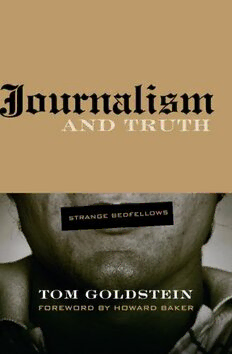
Journalism and Truth: Strange Bedfellows (Medill Visions of the American Press) PDF
227 Pages·2007·1.678 MB·English
Most books are stored in the elastic cloud where traffic is expensive. For this reason, we have a limit on daily download.
Preview Journalism and Truth: Strange Bedfellows (Medill Visions of the American Press)
Description:
The complaint is all too common: I know something about that, and the news got it wrong. Why this should be, and what it says about the relationship between journalism and truth, is exactly the question that is at the core of Tom Goldstein’s very timely book. Other disciplines, Goldstein tells us, have clear protocols for gathering evidence and searching for truth. Journalism, however, has some curious conventions that may actually work against such a goal. Looking at how journalism has changed over time--and with it, notions about accuracy and truth in reporting—Goldstein explores how these long-standing and ultimately untrustworthy conventions developed. He also examines why reliable standards of objectivity and accuracy are critical not just to a free press but to the democratic society it informs and serves. From a historical overview to a reconsideration of a misunderstood book about journalism (The Journalist and the Murderer) to a reflection on the coverage of the war in Iraq, his book offers a remarkably wide-ranging and thought-provoking account of how journalism and truth work—or fail to work—together, and why it matters.
See more
The list of books you might like
Most books are stored in the elastic cloud where traffic is expensive. For this reason, we have a limit on daily download.
